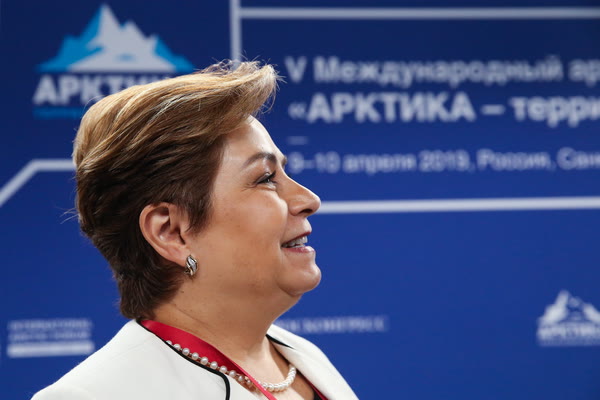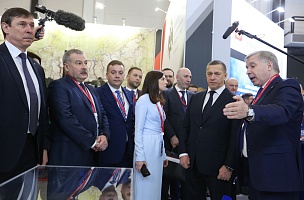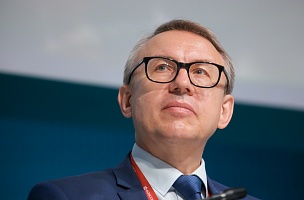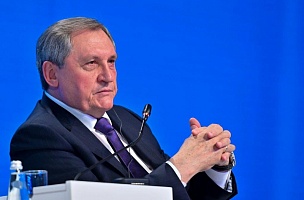KEY CONCLUSIONS
The Arctic needs care
“Based on Agenda 2030, we need to develop the Arctic, while this development needs to keep the ecosystem intact. We need to treat the environment with utmost care. As experts, we must make sure it never turns into a political agenda and stays on track of climate and environmental protection,” Ruslan Edelgeriyev, Advisor to the President of the Russian Federation; Special Presidential Representative on Climate Issues.
“Adaptation is an absolute priority for the Arctic, which is the region that emits less than 1% of greenhouse gases and yet is more vulnerable to climate change,” Boris Porfiriev, Director, Institute of Economic Forecasting, Russian Academy of Sciences (RAS).
“The Arctic belongs to those regions of the Earth that are most vulnerable to climate change. The Arctic is not just an indicator, but a factor of global climate change. It is another factor that impacts extreme weather conditions outside of the Arctic region,” Vladimir Kattsov, Director, Voeikov Main Geophysical Observatory of the Russian Federal Service for Hydrometeorology and Environment Monitoring.
“When we address adaptation of Arctic ecosystems, we call them fragile and vulnerable, because these ecosystems demonstrate a low adaptation potential, especially when it comes to those fast changes that are taking place,” Anna Romanovskaya, Director, Yu.A. Izrael Institute of Global Climate and Ecology of the Russian Federal Service for Hydrometeorology and Environment Monitoring.
Arctic research requires a comprehensive scientific approach
“The Arctic is an exceptionally complicated region and a difficult target for observation, research, physical and mathematical modelling and forecasting,” Vladimir Kattsov, Director, Voeikov Main Geophysical Observatory of the Russian Federal Service for Hydrometeorology and Environment Monitoring.
“I would like to stress out the important fundamental contribution that science has made in order to make this regime credible,” Patricia Espinosa Cantellano, Executive Secretary, United Nations Framework Convention on Climate Change (UNFCCC).
“Our task is to track all the changes in all areas of the Arctic zone. That is why the Russian Hydrometeorological Research Center has been monitoring the hydrometeorological situation and protecting the environment and everything environment-related. And they will continue this effort. <…> As of today, approximately 85–90% of the Arctic research is done by the Russian Hydrometeorological Research Center,” Maxim Yakovenko, Head, Federal Service for Hydrometeorology and Environmental Monitoring
Climate change impacts the Arctic economy
“By the end of the 21st century, the moderate human impact scenario the will make the Northern Sea Route from Western Europe to Southeast Asia more cost effective than the route involving the Suez Canal, even in winter time,” Igor Mokhov, Scientific Leader, Federal State Budgetary Institution of Science A.M. Obukhov Institute of Atmospheric Physics of the Russian Academy of Sciences.
PROBLEMS
Certain countries refuse to comply with the Paris Agreement
“Some of the efforts for international cooperation and multilateralism are losing enthusiasm, however I have to say that in the case of the Paris Agreement this has not been what we have registered. <…> But there is a lot to do in order to comply, in order to fulfil commitments,” Patricia Espinosa Cantellano, Executive Secretary, United Nations Framework Convention on Climate Change (UNFCCC).
Fast climate change in the Arctic
“It is not the climate change itself, but its speed that matters. Let’s take spring in Taymyr: it became 4 degrees warmer over the last 40 years. It was not as fast in the past,” Aleksey Kokorin, Climate Change Officer, World Wildlife Fund Russia.
“The Arctic is warming 2.5 times faster than the rest of the planet <…> Of course, the warming opens up new opportunities, like the Northern Sea Route, per say. But on a country’s or global level, downsides outdo the upsides: for example, permafrost melting can lead to both natural disasters and emission of copious amounts of carbon dioxide,” Sylvie-Agnes Bermann, Ambassador Extraordinary and Plenipotentiary of the French Republic to the Russian Federation.
Incremental negative effect of climate change
“Statistics prove that under climate warming we get significantly more extreme weather conditions both ways – in terms of cold spells and heat waves, while ‘normal’ weather is becoming more scarce,” Roman Vilfand, Scientific Leader, Hydrometeorological Research Center of the Russian Federation.
“We have experienced problems related to climate change – there is no good ice in the Arctic, and the drifting ice station programme was closed in 2013,” Alexander Makarov, Director, Arctic and Antarctic Research Institute.
“Even a small temperature change leads to a negative effect on global economic situation,” Petteri Taalas, Secretary-General, World Meteorological Organization.
SOLUTIONS
Compliance with international climate agreements
“Regarding the Paris Agreement, we are in a situation where we would have more awareness about the need to really urgently implement it. <…> However, it also has to do with the fact that the effects <…> have really exponentially increased. So, the urgency is never more pressing than now,” Patricia Espinosa Cantellano, Executive Secretary, United Nations Framework Convention on Climate Change (UNFCCC).
“Without those investments in in reducing carbon dioxide <…> we are not moving in the right direction in terms of Paris Agreement implementation,” Petteri Taalas, Secretary-General, World Meteorological Organization.
Expanding Arctic research and developing climate change adaptation measures
“It is about time we prepare our society to climate change. For this purpose, we need to take our best effort to study physical, chemical and biological aspects of the ongoing processes. We need to have a clear understanding of what specifically our society will have to adapt to, when our knowledge is still too sketchy,” Sylvie-Agnes Bermann, Ambassador Extraordinary and Plenipotentiary of the French Republic to the Russian Federation.
“The adaptation cost is not just economically, environmentally and climatically imperative, but cost effective as well. <…> The most efficient way to resolve climate-related problems is to combine lower emissions and adaptation,” Boris Porfiriev, Director, Institute of Economic Forecasting, Russian Academy of Sciences (RAS).
“Everyone needs data obtained through direct observation of the high-latitude Arctic. <…> In 2021–22, we will carry on the tradition of high-latitude drifting ice stations, but this time based on safety and new technology,” Alexander Makarov, Director, Arctic and Antarctic Research Institute.






